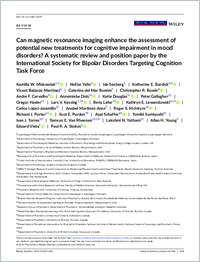Can magnetic resonance imaging enhance the assessment of potential new treatments for cognitive impairment in mood disorders? A systematic review and position paper by the International Society for Bipolar Disorders Targeting Cognition Task Force
DOKPE
- Miskowiak, Kamilla W. ORCID Copenhagen University Hospital, Denmark
- Yalin, Nefize ORCID King's College London, UK
- Seeberg, Ida Copenhagen University Hospital, Denmark
- Burdick, Katherine E. ORCID Harvard Medical School, Boston, Massachusetts, USA
- Balanzá‐Martínez, Vicent University of Valencia, Spain
- Bonnin, Caterina del Mar University of Barcelona, Spain
- Bowie, Christopher R. ORCID Queen's University, Kingston, Canada
- Carvalho, Andre F. ORCID Deakin University, Victoria, Australia
- Dols, Annemieke ORCID Amsterdam Public Health research institute, Netherlands
- Douglas, Katie ORCID University of Otago, Christchurch, New Zealand
- Gallagher, Peter Newcastle University, Newcastle‐upon‐Tyne, UK
- Hasler, Gregor ORCID University of Fribourg
- Kessing, Lars V. ORCID Copenhagen University Hospital, Denmark
- Lafer, Beny ORCID Universidade de São Paulo, Brazil
- Lewandowski, Kathryn E. ORCID Harvard Medical School, Boston, Massachusetts, USA
- López‐Jaramillo, Carlos Universidad de Antioquia, Medellín, Colombia
- Martinez‐Aran, Anabel University of Barcelona, Spain
- McIntyre, Roger S. ORCID University of Toronto, Canada
- Porter, Richard J. ORCID University of Otago, Christchurch, New Zealand
- Purdon, Scot E. University of Alberta, Edmonton, Canada
- Schaffer, Ayal ORCID University of Toronto, Canada
- Sumiyoshi, Tomiki National Center of Neurology and Psychiatry, Tokyo, Japan
- Torres, Ivan J. University of British Columbia, Vancouver, Canada
- Van Rheenen, Tamsyn E. University of Melbourne, Australia
- Yatham, Lakshmi N. University of British Columbia, Vancouver, Canada
- Young, Allan H. King's College London, UK
- Vieta, Eduard ORCID University of Barcelona, Spain
- Stokes, Paul R. A. ORCID King's College London, UK
- 2022
Published in:
- Bipolar Disorders. - John Wiley & Sons. - 2022, vol. 24, no. 6, p. 615-636
English
Background
Developing treatments for cognitive impairment is key to improving the functioning of people with mood disorders. Neuroimaging may assist in identifying brain‐based efficacy markers. This systematic review and position paper by the International Society for Bipolar Disorders Targeting Cognition Task Force examines the evidence from neuroimaging studies of pro‐cognitive interventions.
Methods
We included magnetic resonance imaging (MRI) studies of candidate interventions in people with mood disorders or healthy individuals, following the procedures of the Preferred Reporting Items for Systematic reviews and Meta‐Analysis 2020 statement. Searches were conducted on PubMed/MEDLINE, PsycInfo, EMBASE, Cochrane Library, and Clinicaltrials.gov from inception to 30th April 2021. Two independent authors reviewed the studies using the National Heart, Lung, Blood Institutes of Health Quality Assessment Tool for Controlled Intervention Studies and the quality of neuroimaging methodology assessment checklist.
Results
We identified 26 studies (N = 702). Six investigated cognitive remediation or pharmacological treatments in mood disorders (N = 190). In healthy individuals, 14 studies investigated pharmacological interventions (N = 319), 2 cognitive training (N = 73) and 4 neuromodulatory treatments (N = 120). Methodologies were mostly rated as ‘fair’. 77% of studies investigated effects with task‐based fMRI. Findings varied but most consistently involved treatment‐associated cognitive control network (CCN) activity increases with cognitive improvements, or CCN activity decreases with no cognitive change, and increased functional connectivity. In mood disorders, treatment‐related default mode network suppression occurred.
Conclusions
Modulation of CCN and DMN activity is a putative efficacy biomarker. Methodological recommendations are to pre‐declare intended analyses and use task‐based fMRI, paradigms probing the CCN, longitudinal assessments, mock scanning, and out‐of‐scanner tests.
Developing treatments for cognitive impairment is key to improving the functioning of people with mood disorders. Neuroimaging may assist in identifying brain‐based efficacy markers. This systematic review and position paper by the International Society for Bipolar Disorders Targeting Cognition Task Force examines the evidence from neuroimaging studies of pro‐cognitive interventions.
Methods
We included magnetic resonance imaging (MRI) studies of candidate interventions in people with mood disorders or healthy individuals, following the procedures of the Preferred Reporting Items for Systematic reviews and Meta‐Analysis 2020 statement. Searches were conducted on PubMed/MEDLINE, PsycInfo, EMBASE, Cochrane Library, and Clinicaltrials.gov from inception to 30th April 2021. Two independent authors reviewed the studies using the National Heart, Lung, Blood Institutes of Health Quality Assessment Tool for Controlled Intervention Studies and the quality of neuroimaging methodology assessment checklist.
Results
We identified 26 studies (N = 702). Six investigated cognitive remediation or pharmacological treatments in mood disorders (N = 190). In healthy individuals, 14 studies investigated pharmacological interventions (N = 319), 2 cognitive training (N = 73) and 4 neuromodulatory treatments (N = 120). Methodologies were mostly rated as ‘fair’. 77% of studies investigated effects with task‐based fMRI. Findings varied but most consistently involved treatment‐associated cognitive control network (CCN) activity increases with cognitive improvements, or CCN activity decreases with no cognitive change, and increased functional connectivity. In mood disorders, treatment‐related default mode network suppression occurred.
Conclusions
Modulation of CCN and DMN activity is a putative efficacy biomarker. Methodological recommendations are to pre‐declare intended analyses and use task‐based fMRI, paradigms probing the CCN, longitudinal assessments, mock scanning, and out‐of‐scanner tests.
- Faculty
- Faculté des sciences et de médecine
- Department
- Master en médecine
- Language
-
- English
- Classification
- Pathology, clinical medicine
- License
- CC BY-NC-ND
- Open access status
- gold
- Identifiers
-
- DOI 10.1111/bdi.13247
- ISSN 1398-5647
- Persistent URL
- https://folia.unifr.ch/unifr/documents/327253
Statistics
Document views: 33
File downloads:
- miskowiaketal.2022.pdf: 95
